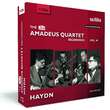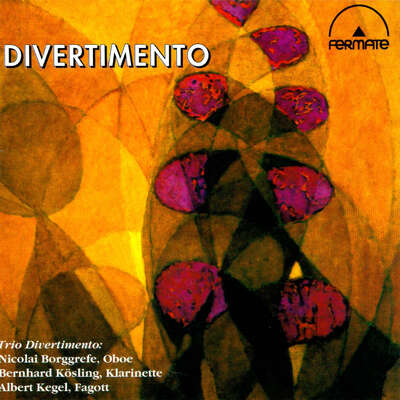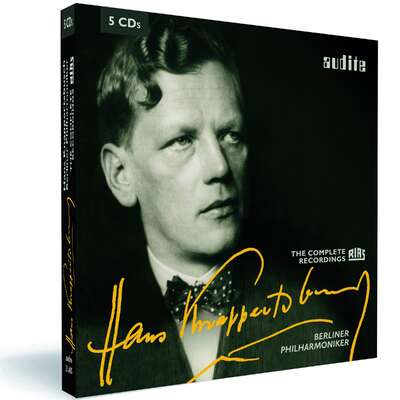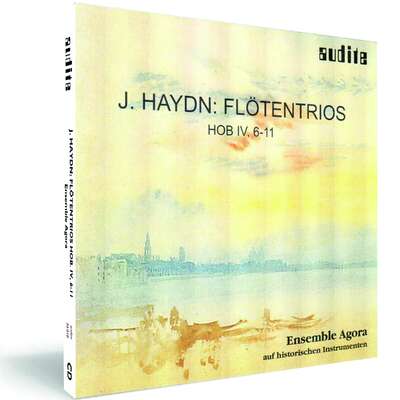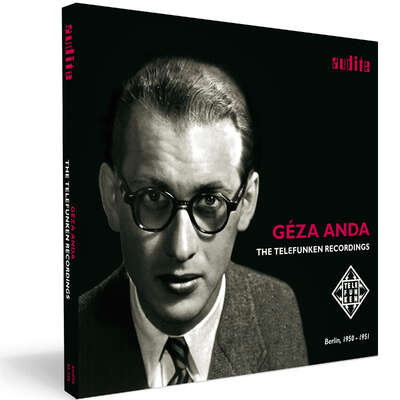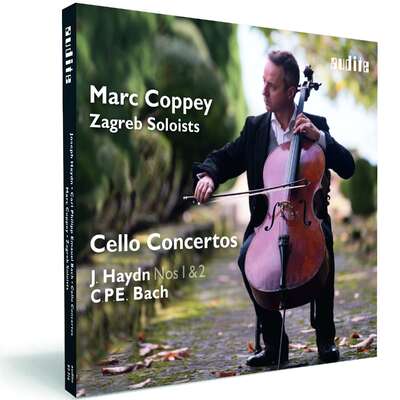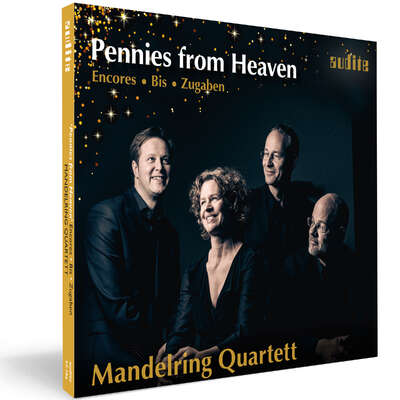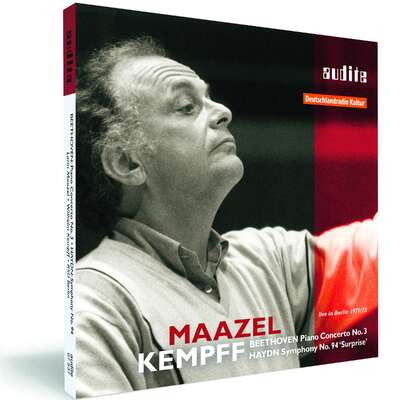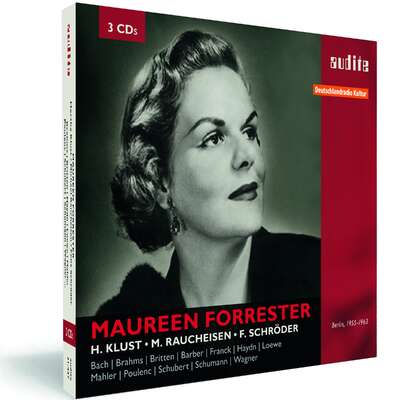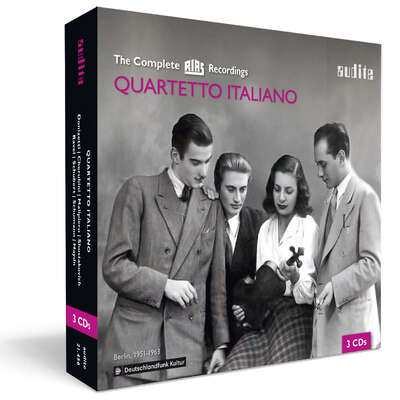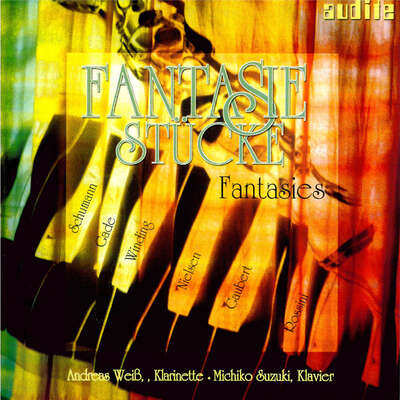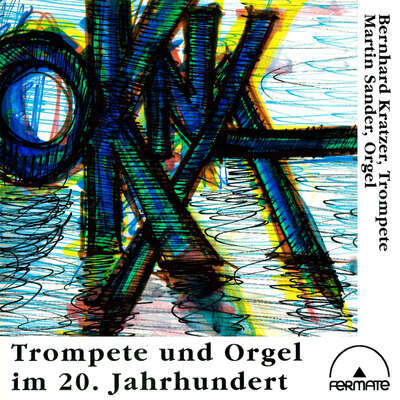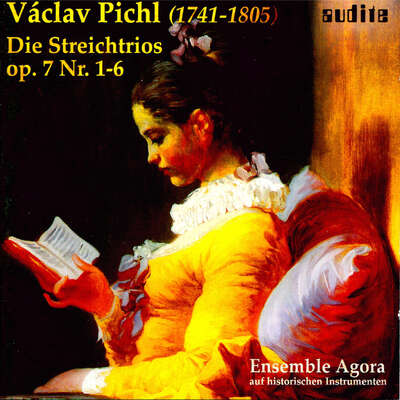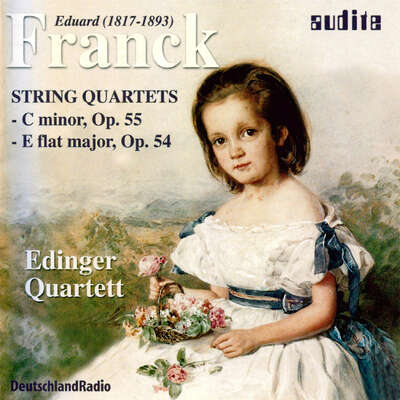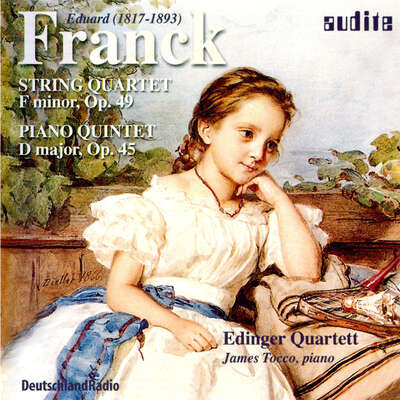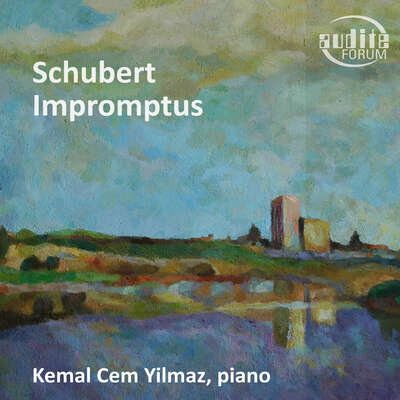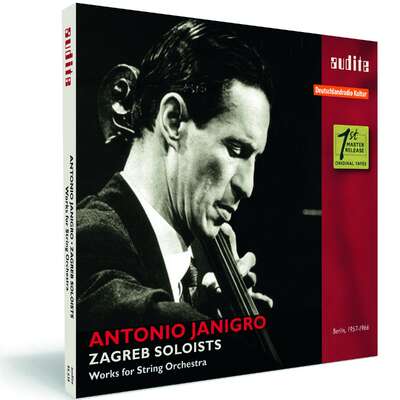
Auto-Rip
Released for the first time, these Berlin radio recordings showcase the Amadeus Quartet performing fourteen string quartets by Joseph Haydn alongside the string quartet version of the “Seven Last Words”. Three string quartets from Haydn’s early period – Op. 9/3, Op. 20/5 and Op. 33/2 – which the Amadeus Quartet never recorded on disc, are presented here for the very first time in the ensemble’s interpretation.more
Released for the first time, these Berlin radio recordings showcase the Amadeus Quartet performing fourteen string quartets by Joseph Haydn alongside the string quartet version of the “Seven Last Words”. Three string quartets from Haydn’s early period – Op. 9/3, Op. 20/5 and Op. 33/2 – which the Amadeus Quartet never recorded on disc, are presented here for the very first time in the ensemble’s interpretation.
Track List
This bonus track is only available as a download!
Details
| The RIAS Amadeus Quartet Haydn Recordings | |
| article number: | 21.426 |
|---|---|
| EAN barcode: | 4022143214263 |
| price group: | CV |
| release date: | 17. March 2017 |
| total time: | 377 min. |
Bonus Material
- digibooklet
-
Producer's comment
First-hand impressions of producer Ludger Böckenhoff [german]
-
The Seven Last Words, Op 51: Texts
assembled version for string quartet and speaker
- WDR3 TonArt_20170421
Informationen
This sixth volume of the RIAS Amadeus Quartet Recordings completes the 27-CD edition. To honour the occasion, we are offering, at www.audite.de/21426, a comprehensive free download of the "Seven Last Words" (RIAS 1952) in a radiophonic version which combines the music recordings with bible readings and literary interpretations of these biblical texts, following the liturgical sequence of the first performance. This extended version complements the 6-CD box set, providing once again a detailed survey of broadcasting history in the 1950s - to which end the entire series of the audite Amadeus Quartet recordings is ultimately directed.
Joseph Haydn's string quartets, often rated as the basis for playing quartets, represented far more than an obligation to the Amadeus Quartet. During their entire career, spanning four decades, they thoroughly and continually dedicated themselves to these works, especially those of Haydn's middle and late periods. Most of their concert programmes featured a quartet by Haydn and in their sonic legacy - recordings on disc and for the radio - Haydn's string quartets make up more than a fifth of the total (only Beethoven's quartets were recorded with a similar frequency). The musicians held these works in such high esteem due, on the one hand, to their relative technical ease and, on the other, their high musical demands, as Norbert Brainin explained: "Everything that one plays in public is difficult. And the easier it is, the more difficult it becomes, as one then hears the fleas cough. Haydn and Mozart are a tightrope act." When preparing and rehearsing these works, the players had to examine the music closely, for many sections which appeared implausible in the old editions later on indeed proved erroneous when they were able to study Haydn's manuscripts and once the Urtext editions had been published.
On disc, the Amadeus Quartet issued the quartets from the Op. 54 set onwards: these first releases of the radio recordings, all made for RIAS Berlin, now also present, for the first time, early Haydn quartets played by the Amadeus Quartet: Op. 9, No 3; Op. 20, No 5; and Op. 33, No 2.
In addition to the authentic quartet works, this edition includes a recording of the "Seven Last Words" in the arrangement for string quartet. Originally conceived for orchestra, later re-worked into an oratorio by the composer, the adaptation for quartet (which Haydn created at the same time as the piano reduction of the original orchestral version) is the most popular and most played version of the work today.
A further bonus track is included on CD 1: the fragment of the second movement from the Amadeus Quartet's first ever Haydn recording session for RIAS made in 1950. The same string quartet, Op. 54 No 2, was also on the music stands for their last RIAS recording session in 1969. Norbert Brainin's violin solo, inspired by Eastern European folk music, sounds almost more idiomatic in the early recording; in any case, the two versions permit an appealing comparison.
Reviews
www.musicweb-international.com | Tuesday August 22nd | Jonathan Woolf | August 22, 2017 | source: http://www.music...
The sixth volume in Audite’s survey of the Amadeus Quartet’s RIAS broadcasts covers a two-decade period between 1950 and 1969 and focuses securelyMehr lesen
Audite have taken the decision to programme the quartets chronologically so that the trio of previously unrecorded quartets appear on the very first CD. This also means that a work recorded in 1951 can be followed by one taped in 1969 which is itself followed by something from 1950. It’s fortunate that the engineers achieved so high a standard throughout the sequence, so that the switch between years is not jarring. Op.9 No.3 is quite taut and forward-moving in the opening, possibly more Allegro than Moderato as marked whilst Brainin’s concertante role in the Menuet is played with rich sweetness. The Adagio in Op. 20 No.5 is beautifully cantilevered, songfully expressive with the decorate first violin flourishes dexterously dispatched. Op.33 No.3, nicknamed The Joke, goes so well in this performance that one wonders why it was so seldom played and never recorded by the quartet. These are the many highlights of the first disc but one shouldn’t omit the rapt slow movement of Op. 54 No.2 which is heard in two contexts – firstly in a performance of the quartet from 1969 and as an appendix, as an isolated movement in a broadcast from June 1950.
Though one now moves into terra cognita from the second disc onwards there are always changes in emphasis or breadth when considering these broadcast performances in the context of the DG legacy. So, for instance, the 1956 reading of Op.64 No.3 is more tightly charged than the later 1973 studio reading and so too is the slow movement of Op.64 No.4 from 1959. There’s just a little bit of an edge to the corporate sound in the November 1951 recording of Op.74 No.1 but it sounds altogether more committed than the tamer-sounding DG LP. I happen to find the tempo of this 1957 reading of the slow movement of The Rider, Op.74 No.3, preferable to the significantly slower but beautifully voiced DG. The group’s readings of Opp.76 and 77 were always amongst their very best and Op.76 No.1 is no exception. There’s little to choose between this 1960 performance and the commercial recording, as the slow movement is beautiful in both cases. The bucolic pizzicati in the succeeding Menuet work equally well here, as indeed does the buoyant and nobly conceived reading of the Emperor, recorded in April 1951. Like the studio performance, the slow movement of The Sunrise is quite expansive. Disc four reveals an Op.77 No.1 that’s slightly more mellow sounding than the shriller DG recording. Warmer, wittier and a lot less acidic this is a real improvement on that commercial legacy. Though the 1950 sound is not of the best, the performance of Op.77 No.2 is laudable with an especially touching and solemn close to the Andante. The Seven Last Words dates from December 1952 and its meditative beauties are perfectly conveyed in this reading. Note that an extended version with the German texts is available as a free download via Audite.
A well-crafted booklet, in German and English, reinforces the novelty of those three early quartets and the fact that all the performances are making their first ever commercial appearance here. All this makes this box of high importance to admirers of this august group.
Diapason | N° 659 Juillet-Août 2017 | Jean-Michel Molkhou | July 1, 2017
C'est par ce sixième volume, intégralement consacré à Haydn, qu'Audite clôt sa prodigieuse série dédiée aux enregistrements du Quatuor AmadeusMehr lesen
Bien que, dans ces témoignages de jeunesse (1951-1952), leur expression n'ait pas encore atteint son plein épanouissement, on y reconnaît déjà (presque) tout ce qui fera la légende des Amadeus : le vibrato de Brainin, leur science de l'agencement des voix et leur volupté instinctive à faire chanter les lignes, tout comme ce zeste d'impatience qui donne une formidable impulsion à leurs archets (finale de l'Opus 74 nO 1). Ces enregistrements ne présentent pas encore la touche d'abandon et la liberté si caractéristiques de leur maturité, mais déjà une poésie divinement organisée et une suprême justesse de goût. Comparaison et confirmation dans les deux versions (1950/1969) du miraculeux Adagio de l'Opus 54 nO 2, qui permettent de mesurer le chemin parcouru. En suivant le fil de ces interprétations, on réalise que l'évolution expressive fut rapide car dès le milieu des années 1950 (Opus 64 nO 3) on reconnaît la grâce, les touches de fantaisie (Menuetto) comme cette irrésistible façon de livrer leur émotion (Adagio) qui feront leur gloire. Plus on avance dans le temps plus leur signature devient claire (Opus 64 nO 4), par les timbres,les vibratos, la vocalité (Adagio) ou la manière de faire respirer les barres de mesure. Ecoutez notamment leur magistrale lecture de l'Opus 77, dans lesquels ils traduisent si clairement la transition entre les langages du XVIIIe et du XIXe siècles (le finale de l'Opus 77 nO 2 est époustouflant). C'est avec les Sept Paroles, dans une vision empreinte de grandeur et de solennité, captée deux ans après leur première gravure officielle pour Westminster, que se conclut cet envoûtant périple en nous laissant un sentiment d'éternité.
www.pizzicato.lu | 28/06/2017 | Uwe Krusch | June 28, 2017 | source: https://www.pizz... Haydn zu spielen ist ein Seiltanz
Haydns Streichquartette und das ‘Amadeus Quartett’, zwei Themen, die nicht so super zusammenpassen wollen. Die vier Musiker waren sich bewusst,Mehr lesen
Trotzdem hat das ‘Amadeus Quartett’ sich nur partiell mit Haydns Quartetten beschäftigt. Insbesondere die späten und reifen Werke wurden gespielt. Von den frühen Kompositionen wurden nur einzelne aufgeführt.
Für die vorliegenden Radioaufnahmen hat das Quartett etliche Stücke zum ersten Mal eingeübt und eingespielt. Insofern ist diese Kollektion ein interessantes historisches Dokument von besonderem Wert.
Die Interpretation ist dagegen aus heutiger Sicht nicht mehr so ganz aktuell. Natürlich legen die vier eine ausgefeilte Deutung vor, doch mit dem heutigen Wissen und den Entwicklungen durch die historisch informierte Aufführungspraxis sind wir an ein anderes Klangideal gewöhnt.
Am Beispiel des letzten Werkes, der ‘Sieben letzten Worte des Erlösers am Kreuze’, ist zu konstatieren, dass das Stück ohne den denkbaren Tiefgang und die Feinheit im Detail etwas zu öffentlichkeitswirksam gespielt wird. Wer das Glück hatte, das Abschiedskonzert des ‘Lindsay Quartet’ in Echternach vor 13 Jahren zu hören, der weiß, dass auch bei einem älteren Quartett eine wunderbar intime, private Deutung quasi mit Ausschluss des Publikums möglich war.
The Amadeus Quartet performs a selection of Haydn quartets. Some pieces were rehearsed and performed the first time by the Amadeus for this radio recording. But the performances are trapped in their time. Today, with all the knowledge provided by the historically informed playing, we are used to another sound ideal. Therefore, this collection is an essentially an interesting historic document.
Gramophone | June 2017 | Rob Cowan | June 1, 2017 | source: https://reader.e...
Three more first-release recordings arrive via Audité’s latest volume of Deutschlandradio Kultur recordings by the Amadeus Quartet, this batchMehr lesen
ClicMag | N° 50 Juin 2017 | Jean-Charles Hoffelé | June 1, 2017
Derrière la perfection formelle, l'intonation parfaite, c'est Haydn qui parait dans toute ses prospectives.Mehr lesen
www.artalinna.com | 27 May 2017 | Jean-Charles Hoffelé | May 27, 2017 | source: http://www.artal... Plutôt que Mozart
Derrière la perfection formelle, l'intonation parfaite, c'est Haydn qui parait dans toute ses prospectives.Mehr lesen
WDR 3 | TonArt | 21.04.2017 | 15.05-17.45 Uhr | Marcus Stäbler | April 21, 2017 | source: http://www1.wdr.... BROADCAST
Anmod.:<br /> In den 50er und 60er Jahren war das Amadeus Quartet oft fürMehr lesen
In den 50er und 60er Jahren war das Amadeus Quartet oft für
